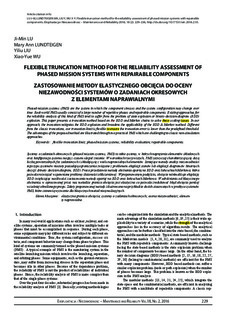Flexible truncation method for the reliability assessment of phased mission systems with repairable components
Journal article
Submitted version
Permanent lenke
http://hdl.handle.net/11250/2402387Utgivelsesdato
2016Metadata
Vis full innførselSamlinger
Originalversjon
Eksploatacja i Niezawodnosc - Maintenance and Reliability 2016, 18(2):229-236 10.17531/ein.2016.2.10Sammendrag
Phased-mission systems (PMS) are the system in which the component stresses and the system configuration may change over time. Real-world PMS usually consist of a large number of repetitive phases and repairable components. Existing approaches for the reliability analysis of this kind of PMS tend to suffer from the problem of state explosion or binary-decision-diagram (BDD) explosion. This paper presents a truncation method based on the BDD and Markov chains to solve these scaling issues. In our approach, the truncation mitigates the BDD explosion and broadens the applicability of the BDD & Markov method. Different from the classic truncations, our truncation limit is flexible to ensure the truncation error is lower than the predefined threshold. The advantages of the proposed method are illustrated through two practical PMS which are challenging to classic non-simulation approaches.
